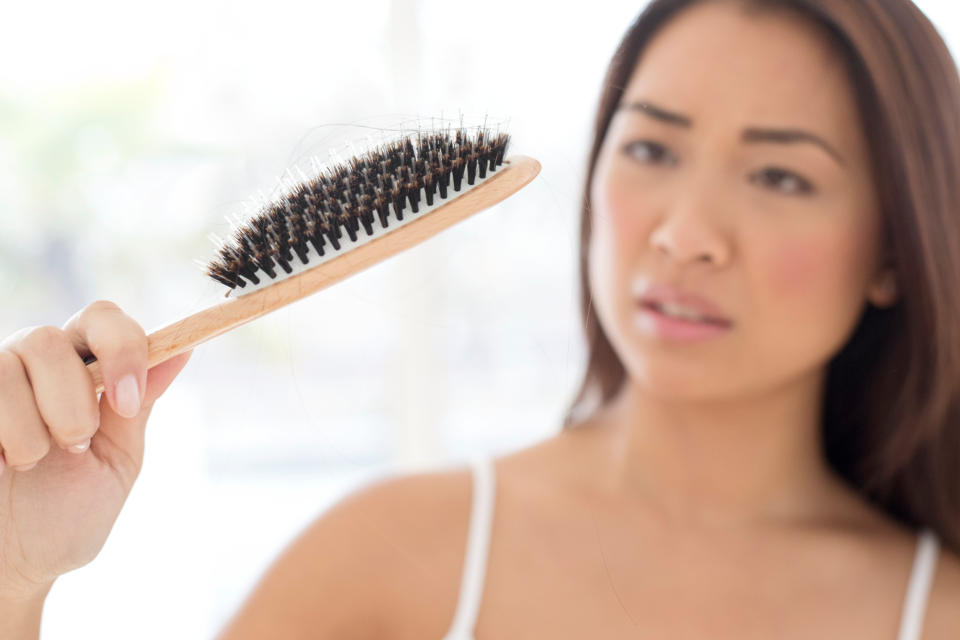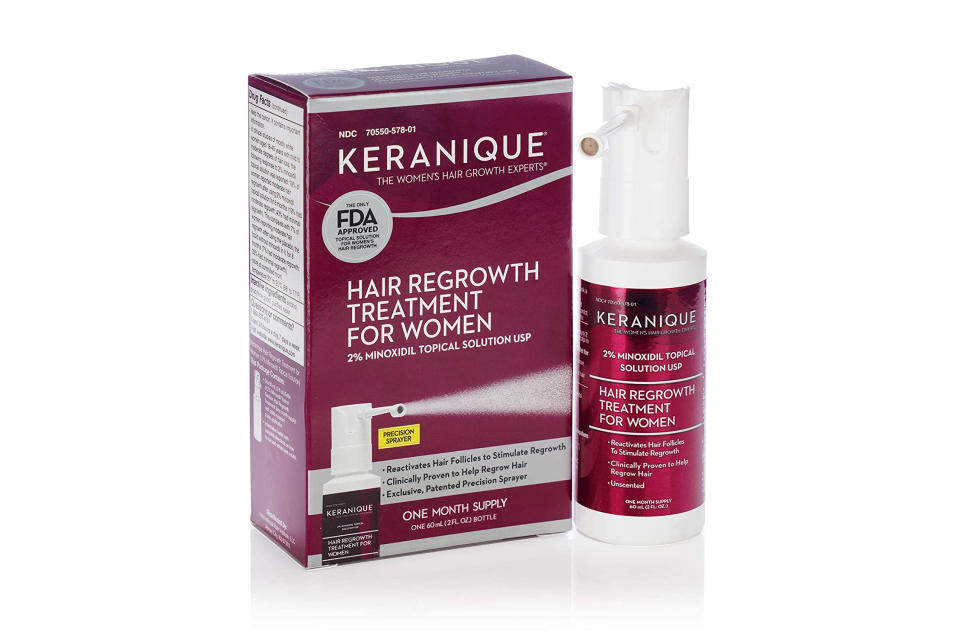Stress can make your hair fall out—but here's how experts say you can stop it
Right now, many people are experiencing heightened levels of anxiety in light of the coronavirus (COVID-19) pandemic, and it’s taking a toll on our minds, bodies, and souls. You might already know that stress can cause acne due to an increased production of cortisol, but it can also affect your hair. So if you’ve noticed that your hair feels thinner or that it’s been falling out more than usual, it’s possible that stress could be the culprit.
To learn more about stress-related hair loss, we tapped two dermatologists and a trichologist, who explain how it works and what we can do to stop it from getting worse.
Why does stress cause hair loss?
“There’s a condition called Telogen Effluvium, where large numbers of hairs are lost after a stressful experience,” explains Annie Chiu, M.D., a board-certified dermatologist in California. Normally, Dr. Chiu explains, hairs only shed when they enter a stage called Telogen, and most hairs are in a constant growing phrase, called Anagen. But when you experience stress or shock, Telogen Effluvium, it “pushes growing anagen hairs into telogen, so you will see a ton of hair loss in a short time,” she says.
How quickly can stress affect hair loss?
Eva Proudman, a clinical trichologist in London, says that significant hair loss can be observed a few months after a stressful period. However, the exact ways in which stress manifests itself are complex and will vary based on the person, says Sophia Kogan, M.D., the co-founder and chief medical advisor of Nutrafol. “Someone who has chronic high stress may notice the effects of a stressful event more immediately, compared to others who may need a major stressor or long-term stress to have a meaningful effect on their hair growth,” Dr. Kogan says.

How common is stress-induced hair loss?
According to the Cleveland Clinic, 50 percent of women will experience noticeable hair loss in their life. Of those, most of them will experience female-pattern hair loss (FPHL), as this affects roughly 30 million women in the U.S. This is different than stress-induced hair loss, but the Cleveland Clinic confirms that stress is a popular cause of female hair loss.
Can you recover from stress-induced hair loss?
This type of hair loss is temporary and almost always resolves in full recovery. However, it may take longer for someone prone to chronic stress to recover than others since their stress isn’t episodic. Ultimately, Dr. Kogan says that shedding stops when stress stops.
How can you stop or slow down stress-induced hair loss?
The first step seems obvious: relieve yourself from stress. But of course, that’s easier said than done. Dr. Chiu recommends yoga, meditation, lavender aromatherapy, drinking chamomile tea before bedtime, and practicing self-care to help to slow down your stress brain waves. Dr. Kogan agrees, saying that combining lifestyle changes with nutritional shifts can be helpful in reducing stress both inside and out. She suggests taking ashwagandha, a botanical that has been clinically shown to help balance stress hormones and build resilience in chronically stressed adults. Additionally, Dr. Kogan suggests avoiding strict diets or cleanses during a particularly stressful time since they could be additional stressors on the body.

What supplements can help stop hair loss and help hair grow back?
Dr. Chiu advises getting the necessary vitamins and nutrients from your diet first, then considering supplements such as biotin. According to one study, 38 percent of women complaining of hair loss have a biotin deficiency, and since biotin helps convert some nutrients into energy, it can help with both hair and nail growth. “I always recommend 500mcg of oral biotin per day to push through the hair loss cycle faster,” Dr. Chiu says. Additionally, she recommends supplements like Nutrafol and Foligain to address overall hair loss. Nutrafol, as Dr. Kogan notes, contains the stress adaptogen, ashwagandha.

Are there any topical products that can prevent further hair loss and stimulate hair growth?
Yes! Look for products with minoxidil, an FDA-approved active ingredient that’s proven to promote hair regrowth with continued use. According to the Mayo Clinic, side effects may include itchiness and skin irritation, so always do a patch test and wait 24 hours to see how your skin responds to it.

Are there any professional treatments that can reverse the effects of hair loss and hair thinning?
Also, yes. “Platelet-rich Plasma (PRP) injections can be extremely effective for numerous types of hair loss, including both hormonal and stress-induced hair loss,” says Dr. Chiu. Just note that they can be painful and that the treatment requires multiple sessions. “Once this [pandemic] is over, you can schedule an appointment with your board-certified dermatologist for this treatment,” she suggests.


